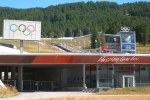News
Déjà-vu: Winter Olympic Games in Italy

After the Alpine cities of Sion, Graz and Innsbruck, as well as Sapporo in Japan and Calgary in Canada withdrew their candidacies, the International Olympic Committee (IOC) awarded the 25th Winter Olympics to Milan and Cortina. The duo prevailed over Stockholm and Åre, whose bid was not really convincing and was only half-heartedly supported by the Swedish government. In Italy, the enthusiasm of politicians and media is boundless. But is the jubilation really justified? Or is there cause for concern?
According to the application, the Games are to be spread over several locations and many existing facilities used. The experience of Turin 2006, especially if you look at the total costs and the abandoned bobsleigh tracks, ski jumps and biathlon facilities in the mountain villages, should actually be a lesson for the organisers and politicians, says Francesco Pastorelli, Managing Director of CIPRA Italy. “A large city like Milan may be able to cope with such a major event and even profit from it. But this is not the case for the mountain areas affected – Valtellina and the Dolomites.”
In the form in which they are conceived today by the IOC, these major events are not suitable for mountain regions, as CIPRA has always stressed in its “Olympic-free Alps” position. “There is not a single study that seriously shows that the Games have made a long-term and positive contribution to economic development in an Alpine region”, Pastorelli emphasises. On the contrary, experience shows that the economic effects of the Olympic Games are short-lived, if indeed there are any at all.
Shortly after the Milan and Cortina bid was accepted, the shares of real estate and construction companies rose on the Milan Stock Exchange. The concern that the Games will be used as a pretext to build new ski resort connections and transport infrastructures is therefore more than justified.
Sources and further information:
twnews.it/it-news/risanamento-vola-in-borsa-effetto-olimpiadi-invernali (it), www.ilfoglio.it/economia/2019/06/25/news/effetto-olimpiadi-a-piazza-affari-262247/ (it), www.milanocortina2026.coni.it/images/CandidatureFile_MilanoCortina2026_eng.pdf (it), https://corrierealpi.gelocal.it/belluno/cronaca/2019/06/25/news/gli-ambientalisti-contro-le-olimpiadi-a-cortina-1.35692565 (it), www.cipra.org/it/dossiers/giochi-olimpici-invernali/rapporti-sulla-base-delle-esperienze-1/giochi-olimpici-di-torino-2006 (it), www.cipra.org/it/posizioni/alpi-libere-da-olimpiadi (it)





